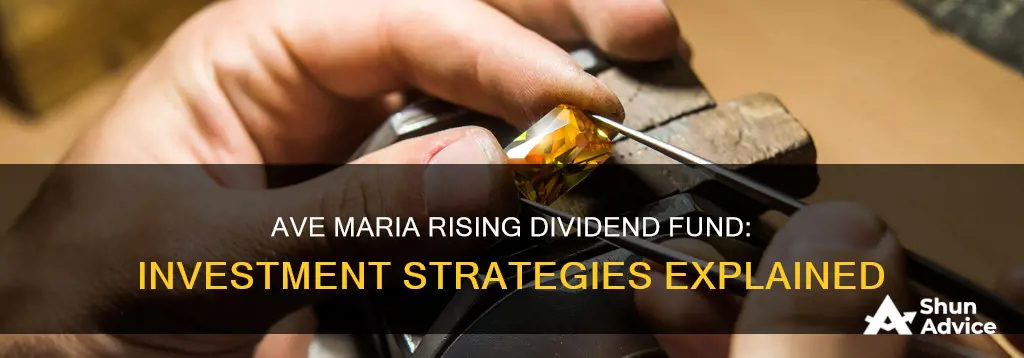
The Ave Maria Rising Dividend Fund is a mutual fund that seeks to increase dividend income over time, prioritising long-term growth and a reasonable level of current income. The fund's strategy involves investing primarily in the common stocks of companies that pay dividends, with the expectation that these dividends will increase over time. In alignment with its religious affiliation, the fund ensures that its investments do not violate the core values and teachings of the Roman Catholic Church. With a minimum initial investment of $2,500, the Ave Maria Rising Dividend Fund offers investors access to a diversified portfolio of dividend-paying stocks, aiming to balance financial returns with religious principles.
| Characteristics | Values |
|---|---|
| Investment Style | Mid Blend |
| Morningstar Category | Large Blend |
| Share Class Type | No Load |
| Min. Initial Investment | 2,500 |
| Expense Ratio | 0.91% - 0.92% |
| 1-Day Return | +0.51% |
| Total Assets | 1.1 Bil |
| Top Holdings | Diamondback Energy Inc, Texas Pacific Land Corp, Broadridge Financial Solutions Inc, Texas Instruments Inc, Mastercard Inc Class A |
What You'll Learn

Religious criteria
The Ave Maria Rising Dividend Fund is a Catholic fund that invests in dividend-paying stocks that do not violate the core values and teachings of the Roman Catholic Church.
Under normal circumstances, all of its equity investments (including common stocks, preferred stocks and securities convertible into common stock) and at least 80% of the fund's net assets will be invested in companies that meet its religious criteria.
The fund seeks increasing dividend income over time, long-term growth, and a reasonable level of current income. It will invest at least 80% of its net assets in the common stocks of dividend-paying companies that are expected to increase their dividends over time and provide long-term growth of capital.
The Ave Maria Mutual Funds are no-load and have no sales charges or commissions. They are available to investors through various types of investment accounts, including individual, joint, custodial and retirement accounts such as IRAs.
The S&P 500 Index Fund: A Smart Investment Move?
You may want to see also

Common stocks
The Ave Maria Rising Dividend Fund is a mutual fund that seeks to increase dividend income over time, achieve long-term growth, and provide a reasonable level of current income. The fund primarily invests in common stocks of dividend-paying companies that are expected to increase their dividends and deliver long-term capital growth.
Under normal circumstances, the fund commits to investing at least 80% of its net assets in the common stocks of companies that meet specific religious criteria. These companies are chosen based on their alignment with the core values and teachings of the Roman Catholic Church. This strategy ensures that the fund's investments do not violate religious principles while seeking to generate returns for investors.
The fund's common stock investments encompass a diverse range of sectors, including basic materials, communication services, consumer cyclical, consumer defensive, and financial services. By investing in dividend-paying stocks, the fund aims to provide a steady stream of income that grows over time.
Some of the notable common stock holdings of the Ave Maria Rising Dividend Fund include:
- Texas Pacific Land Corp (TPL)
- Diamondback Energy Inc (FANG:NSQ)
- Broadridge Financial Solutions Inc (BR:NYQ)
- Texas Instruments Inc (TXN)
- Accenture PLC Class A (ACN)
- Mastercard Inc Class A (MA)
- Pioneer Natural Resources Co (PXD)
- Chevron Corp (CVX)
These common stocks represent a range of industries, including energy, technology, and financial services. By investing in these companies, the Ave Maria Rising Dividend Fund seeks to balance financial returns with adherence to religious values.
Overall, the Ave Maria Rising Dividend Fund offers investors an opportunity to align their investments with their religious beliefs while seeking increasing dividend income and long-term capital appreciation through investments in common stocks of dividend-paying companies.
A Guide to Investing in Foreign Mutual Funds from India
You may want to see also

Preferred stocks
The Ave Maria Rising Dividend Fund is a mutual fund that seeks to achieve increasing dividend income, long-term growth of capital, and a reasonable level of current income. The fund's investment strategy includes investing in a variety of equity instruments, including common stocks, preferred stocks, and securities convertible into common stock.
One key advantage of preferred stocks is their dividend payout. These stocks typically offer a fixed dividend that is paid out at regular intervals, such as quarterly or annually. This dividend payment takes precedence over dividends paid to common stockholders, meaning that preferred shareholders receive their dividends first. The Ave Maria Rising Dividend Fund seeks to invest in companies that are expected to increase their dividends over time, and preferred stocks offer a more predictable and stable source of dividend income.
In addition to dividend priority, preferred stocks often provide other benefits to shareholders. For example, preferred stockholders may have greater voting rights or influence in certain company decisions. They may also have a higher claim on a company's assets in the event of liquidation, receiving their original investment back before common stockholders. These features make preferred stocks a relatively less risky investment compared to common stocks.
The Ave Maria Rising Dividend Fund carefully selects companies that meet specific religious criteria, in alignment with its core values and the teachings of the Roman Catholic Church. Therefore, the fund's preferred stock investments are likely to be in companies that align with these religious and ethical standards.
By including preferred stocks in its portfolio, the Ave Maria Rising Dividend Fund gains exposure to a stable source of dividend income, enhancing the overall dividend yield of the fund. This strategy helps the fund achieve its primary objective of increasing dividend income over time while also providing a reasonable level of current income for its investors.
Setting Up an Investment Fund: Switzerland's Guide
You may want to see also

Securities convertible into common stock
Convertible securities are considered hybrid instruments, possessing characteristics of both debt and equity. They offer cash flow features of both bonds and stocks, providing a unique blend of upside potential and downside protection. This duality is particularly attractive in volatile markets, where the fixed-income stability combined with the potential for equity-like returns can effectively manage risk.
One of the key advantages of convertible securities is the protection they offer against significant losses. They also provide higher income than common stock, making them appealing to investors seeking higher returns. Additionally, convertible securities can serve as a diversification tool, helping to spread risk across asset classes and sectors.
Convertible preferred stocks, a type of convertible security, offer the potential for dividends and the ability to convert into common shares. They are considered a hybrid security, providing the benefits of both preferred and common stock. By investing in convertible preferred stocks, the Ave Maria Rising Dividend Fund can prioritise dividend income while also having the option to convert the stocks into common shares if they believe the price will increase.
The fund's investment strategy, which includes securities convertible into common stock, aligns with its overall objective of seeking increasing dividend income over time, long-term growth of capital, and a reasonable level of current income. By utilising these convertible securities, the fund can balance its goal of increasing dividend income with the religious criteria that guide its investment choices.
Mutual Fund Investment: What You Need to Know
You may want to see also

Long-term growth
The Ave Maria Rising Dividend Fund seeks long-term growth of capital through investment in the common stocks of companies that pay dividends and are expected to increase their dividends over time. The fund aims to achieve increasing dividend income and a reasonable level of current income while adhering to the core values and teachings of the Roman Catholic Church.
To achieve long-term growth, the fund invests primarily in dividend-paying stocks, with a focus on companies that have a track record of increasing their dividends consistently. Specifically, the fund commits at least 80% of its net assets to the common stocks of such companies, including any borrowings for investment purposes. This strategy aligns with the fund's objective of maximising long-term growth potential while generating increasing dividend income.
The fund's equity investments encompass common stocks, preferred stocks, and securities convertible into common stock. It maintains a diversified portfolio, investing in various sectors, including basic materials, communication services, consumer cyclical, consumer defensive, and financial services. As of June 30, 2024, the fund's top holdings included Texas Pacific Land Corp, Diamondback Energy Inc, Texas Instruments Inc, Mastercard Inc Class A, and Accenture PLC Class A.
The Ave Maria Rising Dividend Fund has a Morningstar Medalist Rating and is considered a Large Blend fund with a Mid Blend investment style. It has an expense ratio of around 0.91-0.92%, and the minimum initial investment amount is $2,500. The fund has produced positive returns, with a 1-year change of +12.64% as of June 17, 2024, and an overall return of 8.46% over the past decade.
Overall, the Ave Maria Rising Dividend Fund offers investors a strategy that combines long-term growth with a focus on increasing dividend income, all while adhering to specific religious criteria.
Crowdfunded Real Estate: Your Guide to Investing Wisely
You may want to see also
Frequently asked questions
The Ave Maria Rising Dividend Fund invests in the common stocks of dividend-paying companies that are expected to increase their dividends over time and provide long-term growth of capital.
The minimum initial investment for the Ave Maria Rising Dividend Fund is $2,500.
The expense ratio of the Ave Maria Rising Dividend Fund is 0.91 percent or 0.920%.







